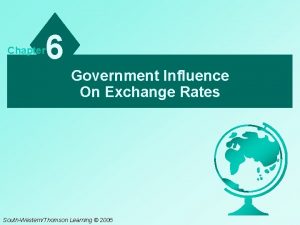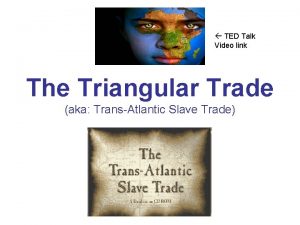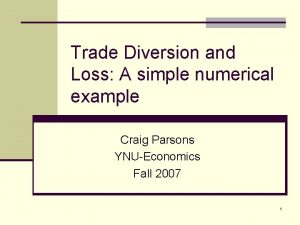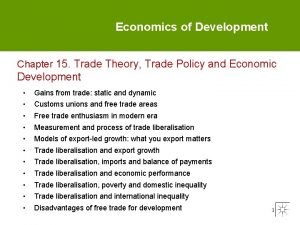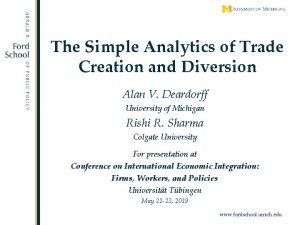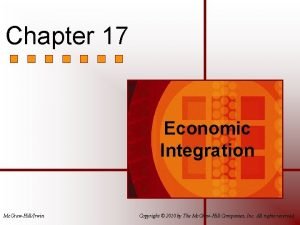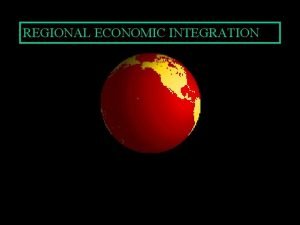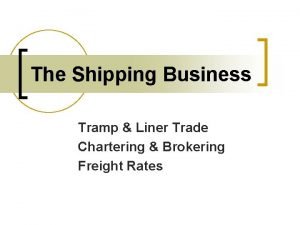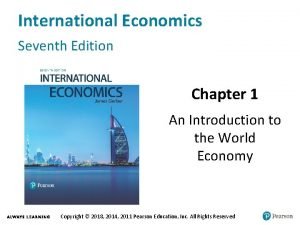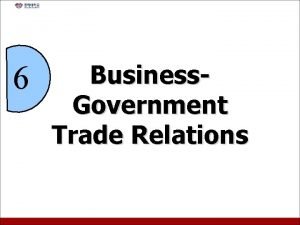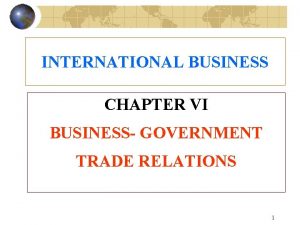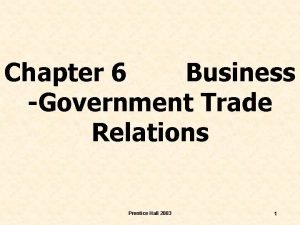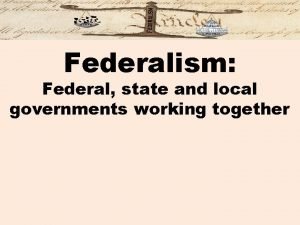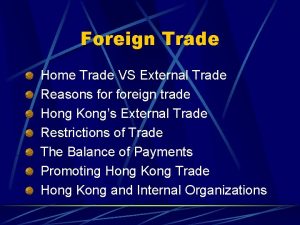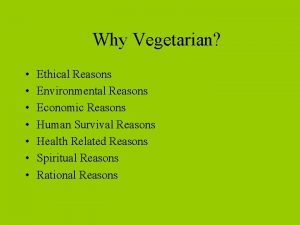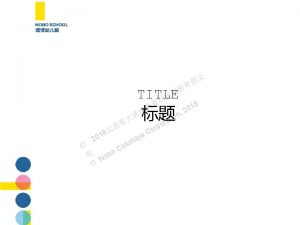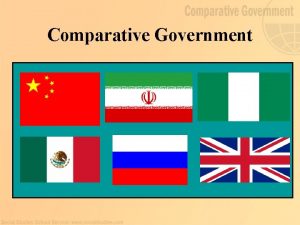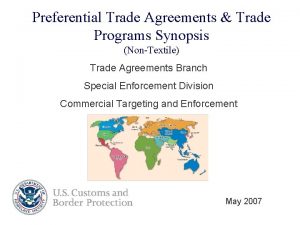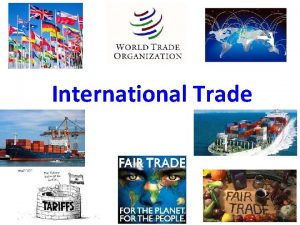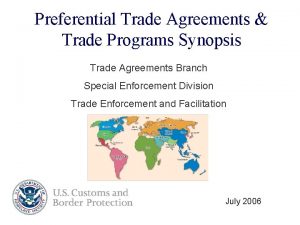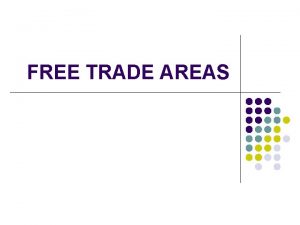Chapter5 Contents Reasons for government influence on trade
















- Slides: 16

Chapter-5

Contents Reasons for government influence on trade, Economic Rationales for Governmental Intervention, Noneconomic rational for government intervention, Instruments of Trade Control, Tariff and Nontariff Barriers, Dealing with Governmental Trade influence, Protectionism

Why Government Influence on Trade? All Governments have some political and economic reasons for intervening in international trade. When governments intervene, they often do so by restricting imports of goods and services into their nation, while adopting policies that promote exports. Normally their motives are to protect domestic producers and jobs from foreign competition while increasing the foreign market for products of domestic producers. All countries seek to influence trade and each has: a) b) c) Economic, social, and objectives Conflicting Objectives Interest groups political

The Rationale For Governmental Intervention in Trade may be classified on the follwoing two ways: Economic Rationales Noneconomic Rationales Prevent Unemployment Maintain Industries Protect Infant Industries Deal with Countries Promote Industrialization Improve compared Countries Maintain influence Essential unfriendly spheres of position Preserve national identity to other

The Rationale For Governmental Intervention 01. Unemployment Import restrictions may lead to retaliation by other countries, may decrease export jobs Loss of jobs in industries that rely on imported Products Cost of protectionism: higher prices, low quality, lack of Innovation 02. Infant Industry Argument Production becomes more competitive over time because of increased economies of scale and greater workers efficiency

The Rationale For Governmental Intervention. . 03. Industrialization Argument Countries seek protection industrialization Because: to promote a) brings faster growth than agriculture b) diversifies the economy c) brings more price increases than primary products do. 4. Shifting Workers from Agriculture into manufacturin • Output increases if the marginal productivity of agricultural workers is very low. Social concerns •

The Rationale For Governmental Intervention. . 05. Promoting Investment Inflows Import restrictions increase direct investment 06. Diversification 07. Terms of Trade Deterioration of terms of trade may countries prompt promote industrialization 08. Import Substitution versus Export Promotion Export-Led Development

The Rationale For Governmental Intervention. . 09. Balance-of-Payments Adjustments • Countries may choose to restrict the least essential Imports • Export restrictions • Import Restrictions may prevent dumping 10. Maintaining Essential Industries 11. Preserving Cultures and National Identity

1. 2. 3. 4. 5. Tariff Quota Subsidies Aids and Loans Customs Valuation 6. “Buy Local Legislation” 7. Price Ceilling 8. Standards 9. Specific permission Requirements 10. Administrative Delays and Procedures 11. Countertrade 12. Restrictions on Services • Essentiality • Standards • Immigrations

Tariff 1. Tariffs is the Tax on imported goods, it is known as a specific duty. 2. It may also be assessed as a percentage of the value of the item, in which case it is known as an ad valorem duty. 3. If both a specific duty and ad valorem duty are charged on the same product , the combination is known as a compound duty. 4. When government decides to accommodate opponents of free trade, it is apt to use tariffs or quotes to restrict trade 5. Can be a fixed dollar amount per physical unit or a percentage of good’s value 6. Tariffs reduce volume of trade and raise domestic prices of imported goods 7. In the country that imposes the tariff, producers gain and consumers lose 8. World as a whole loses, because tariffs decrease volume of trade and therefore decrease gains from trade

02. Quotas – Government decree limiting imports of a good to a specified maximum physical quantity – Because goal is to restrict imports, a quota is set below the level of imports that would occur under free trade – General effects are same as a tariff • Reduce quantity of imports and raise domestic prices • While both tariffs and quotas help domestic producers – They reduce benefits of trade to the nation as a whole • However, a tariff has one saving grace – Increased government revenue

03. Subsidies • Countries sometimes make direct payments to domestic companies to compensate them for losses incurred from selling abroad. • Subsidies to overcome market imperfections are the least controversial • There has been increased effort to assist companies’ export plans

Dealing With Government Trade Influence • When facing import Competition, companies can– Move abroad – Seek other market niches – Make domestic output competitive – Try to get government protection

Protectionism • Groups who suffer from trade with other nations have developed a number of arguments against free trade – Together, these arguments form a position known as protectionism • Belief that a nation’s industries should be protected from free trade with other nations • Myths about international trade – A high-wage country cannot afford free trade with a low-wage country • High-wage country will either be undersold in everything and lose all of its industries, or else its workers will have to accept equally low wages and equally low living standards – Low-productivity country cannot afford free trade with a high-productivity country • Former will be clobbered by latter and lose all of its industries – In recent times, America’s unskilled workers have suffered because of ever-expanding trade between United States and other countries

Sophisticated Arguments for Protection • Strategic trade policy and support for infant industries are controversial • Opponents stress three problems • Once government assistance to an industry is accepted • Special interest groups of all kinds will lobby to get the assistance • Whether it benefits general public or not When one country provides assistance to an industry by keeping out foreign goods, other nations may respond in kind • If they respond with tariffs and quotas of their own, result is a shrinking volume of world trade and falling living standards • If subsidies are used to support a strategic industry, and another country responds with its own subsidies, then both governments lose revenue • Neither gains the sought-after profits • Strategic trade policy assumes that government has information to determine which industries, infant or otherwise, are truly strategic and which are not

Sophisticated Arguments for Protection • Arguments help to remind us of conditions under which free trade is most beneficial to a nation – Production is most likely to reflect principle of comparative advantage • When firms can obtain funds for investment projects • When they can freely enter industries that are profitable – Thus, free trade, without government intervention, works best when markets are working well • May partly explain why United States has for decades been among the strongest supporters of free trade ideal
 Government influence on exchange rates
Government influence on exchange rates Triangular trade video
Triangular trade video Trade diversion and trade creation
Trade diversion and trade creation Fair trade not free trade
Fair trade not free trade Trade diversion and trade creation
Trade diversion and trade creation Trade diversion and trade creation
Trade diversion and trade creation Trade diversion and trade creation
Trade diversion and trade creation Trampliner
Trampliner The trade in the trade-to-gdp ratio
The trade in the trade-to-gdp ratio Business government trade relations
Business government trade relations Business government trade relations
Business government trade relations Business government trade relations
Business government trade relations National government vs federal government
National government vs federal government Ministerstyre för och nackdelar
Ministerstyre för och nackdelar Redogör för vad psykologi är
Redogör för vad psykologi är Ramsa geometriska former
Ramsa geometriska former Bästa kameran för astrofoto
Bästa kameran för astrofoto
